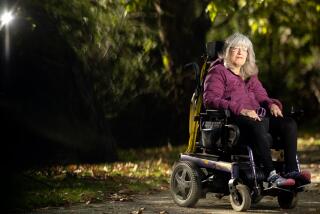Court Allows $250,000 Limit for Pain, Suffering : Ceiling on Malpractice Awards Upheld
WASHINGTON — The Supreme Court today let stand a ruling that allows states to place a ceiling on malpractice awards in the case of a California woman who lost $2 million in damages from an operation that left her a quadriplegic.
The justices refused to hear Cassandra Green’s appeal of a state Supreme Court decision upholding an appeals court ruling that had slashed her award for pain and suffering to $250,000, saying the case failed to raise a substantial constitutional question.
At issue is the fairness of a California law that places a $250,000 lid on pain and suffering damages in medical malpractice suits--legislation passed in response to skyrocketing insurance premiums.
The Legislature, fearing doctors would stop performing certain operations because of the soaring cost of insurance, passed the Medical Injury Compensation Reform Act in 1975 to rein in jury awards in malpractice suits.
A dispute erupted when the state appeals court applied the law to Green’s original jury award of $2.3 million for pain and suffering and cut the damages to conform to the legislation. The state Supreme Court declined to review the ruling.
Green, who suffered brain damage during the gynecological operation and was left a quadriplegic, equated the court’s action with a confiscation of property and appealed to the Supreme Court to reverse the decision.
The mother of five was allowed to keep more than $3 million of the jury’s original $5.5 million award for the 1977 operation that left her a brain-damaged quadriplegic.
“In its effort to solve the medical malpractice insurance problem, California has required a severely injured woman to dedicate her rightful property to the insurance industry in furtherance of the public good,” lawyers for Green argued.
“If that industry requires public subsidy, the public, and not the severely injured victims of medical malpractices such as Cassandra Green, must shoulder that expense.”
But lawyers for Aram Franklin, the doctor who administered the anesthetic to Green, cited a recent state Supreme Court ruling that allowed the Legislature to limit malpractice damages if the action served a legitimate purpose, such as averting a health crisis.
More to Read
Get the L.A. Times Politics newsletter
Deeply reported insights into legislation, politics and policy from Sacramento, Washington and beyond. In your inbox three times per week.
You may occasionally receive promotional content from the Los Angeles Times.






![[20060326 (LA/A20) -- STATING THE CASE: Marchers organized by unions, religious organizations and immigrants rights groups carry signs and chant in downtown L.A. "People are really upset that all the work they do, everything that they give to this nation, is ignored," said Angelica Salas of the Coalition of Humane Immigrant Rights. -- PHOTOGRAPHER: Photographs by Gina Ferazzi The Los Angeles Times] *** [Ferazzi, Gina -- - 109170.ME.0325.rights.12.GMF- Gina Ferazzi/Los Angeles Times - Thousands of protesters march to city hall in downtown Los Angeles Saturday, March 25, 2006. They are protesting against House-passed HR 4437, an anti-immigration bill that opponents say will criminalize millions of immigrant families and anyone who comes into contact with them.]](https://ca-times.brightspotcdn.com/dims4/default/34f403d/2147483647/strip/true/crop/1983x1322+109+0/resize/840x560!/quality/75/?url=https%3A%2F%2Fcalifornia-times-brightspot.s3.amazonaws.com%2Fzbk%2Fdamlat_images%2FLA%2FLA_PHOTO_ARCHIVE%2FSDOCS%2854%29%2Fkx3lslnc.JPG)



